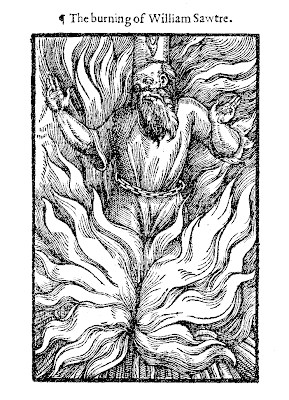Sunday, October 21, 2012
Quotable: Chaos vs. Order
Chaos is life! As much as Order is death.
Source: Character of the keeper in Forbidden by Ted Dekker and Tosca Lee. (Center Street, 2011) p. 276.
Labels: anarchism, art and literature, Christianity
Monday, October 15, 2012
Quotable: "Study of the sufferings of Jews"
... prior to modern times Jews had seen their sufferings as imposed by a righteous god in response to their own failings. Now it became the perverse Gentiles who were oppressing wholly innocent Jews - and those Other Nations were no longer seen as mere tools of God.
Such modern ideologies as socialism, (both Marxist and anarchist), Zionism, and various forms of the psychiatric worldview (Freudian psychoanalysis and related schools) all emphasize the tainted or sick qualities of Gentile existence, be it in exploitative capitalism, aggressive nationalism, or repressive Victorian prudery. Jewish frustration, anxiety, and rage at being considered inferior, and in some partial and tormented sense agreeing with that evaluation, found an alluring outlet in these ideologies - and a hope for eventual redemption.
Obviously, these ideologies cannot be described as simply or explicitly Jewish condemnations of the Gentile world; non-Jews in great numbers were also attracted to them. ... But by the end of the nineteenth century Jews were attracted to socialism and, after 1917, communism in significantly greater proportions than were non-Jews. It is instructive that it was Jewish intellectuals, Marx and Freud are the most obvious examples, who became the most brilliant and preeminent exponents of these modern theories.
... Study of the sufferings of Jews [i.e. Leidensgeschichte - "suffering-history, or the tendency to write Jewish history largely in terms of the suffering endured by the Jews at the hands of Gentiles"] is now advocated mostly as a way of preventing suffering in the future, largely by exposing the sinful or corrupt nature of Gentile society and its responsibility for Jewish suffering and almost never as a means by which Jews could become aware of their own sins, except insofar as an error in judgment, a naive misperception of Gentile malevolence, is considered a sin. Anything else, again, would be blaming the victim.
Source: Albert S. Lindemann. Esau's Tears: Modern Anti-Semitism and the Rise of the Jews. (Cambridge UP, 1997) pp. 14-15.
See also: Esau's Tears reviewed by Kevin MacDonald
Labels: history, Jews, quotations
Monday, October 01, 2012
Executed Over Translating the Bible
Pictured at right: The execution of William Sawtry, "the first Wycliffite martyr to be burned at the stake after the passage of the statute De heretico comburendo", as depicted in John Foxe's Acts and Monuments.
In "civilized" Europe, not so long ago--relative to the broad scope of human history--professing Christians killed other professing Christians over translating the Bible into the vernacular or common language of the people and related doctrinal matters. You see in 1401, inspired by the proliferation of so-called Wycliffe Bibles, the English Parliament passed an act known as De heretico comburendo, Latin for "Regarding the heretic who is to be burnt".
Among other things, it made it unlawful to "make or write any book contrary to the catholic faith or determination of the Holy Church". The "determination" of "the Holy Church" being that, as far as the laity was concerned, the Bible should be in Latin only because "... Scripture was given only to, and could only be understood by, either the extremely learned. 'the doctors', or the clergy". So writes David Daniell in The Bible in English (Yale UP, 2003; p. 68).
As Daniell notes: "Heresy was soon to include reading not just owning even a scrap of Scripture not in Latin" (p. 68). Daniell, citing Nicholas Watson, further writes: "the capacity of the English language was rejected; the lower classes were refused [English] texts; limitations were imposed on what it was 'necessary' to know; and the role of clergy as guardians of truth and controllers of its communications was emphasised" (p. 110).
De heretico comburendo was enforced well into the 1500s and, "between 1553 and 1558 ... about 300 men and women were burned alive" (p. 263) under the law. Perhaps the best known victim of the vernacular-Bible-as-heresy principle was English Bible translator William Tyndale, who was executed in October 1536 in Belgium.
Labels: Christianity, religion, thoughtcrime, violence





